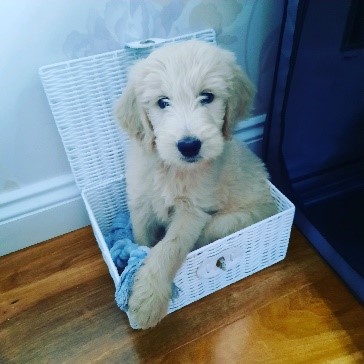Our School Dog
WE’RE GETTING A SCHOOL DOG!
Dear Parents and Carers,
I am writing to inform you that we will soon be adding a new member to our St Barnabas community. As of November 2022, we will be welcoming a school dog who will join us on a regular basis to begin socialising and training.
Betsy, a Goldendoodle is owned by our Business Manager, Laura Langley. Betsy will be 18 weeks old when she starts coming into school and will be ready to join our school community for this academic year!



Laura chose this breed for the following reasons:
- The majority of Goldendoodle’s are considered non-allergenic. Some malt a very small amount, but there is a significant reduced risk of allergic reactions.
- The breed is known to be child-friendly, gentle mannered and affectionate, yet sensitive.
- The breed is known to be highly intelligent and respond excellently to training.
Betsy is undergoing specific training, to ensure she is well-trained for being around children. We wish to reassure parents that we have undertaken a significant amount of research into bringing a school dog to join the St Barnabas family and believe the positive effects demonstrably outweigh any negatives. Some of the many benefits of having a school dog include the following:
- Cognitive development – building a companionship with a dog helps children stimulate their memory, problem-solving and game-playing skills. Having a school dog is known to increase enthusiasm for, and enjoyment of animals, which motivates children to think and learn.
- Social skills – dogs provide a mutual topic for conversation with others, and encourage responsibility, wellbeing and focussed interaction with others.
- Emotional skills – dogs improve self-esteem, acceptance from others and are known for improving moods. Dogs can also help children develop compassion and respect for other living things and can reduce children’s anxiety. Building respect can improve children’s relationships with each other, parents and teachers and shows them how to nurture and care for another living thing. If any children are suffering from bereavement or are particularly sad, dogs can provide children with comfort and friendship.
- Physical development – interaction with dogs is known to reduce blood pressure, provide tactile stimulation, assist with pain management and give motivation for children to move and walk.
- Reading – school dogs are known to help children with their reading and literacy skills, through their calming presence and ability to listen to children read without being judgemental or critical. Children can build their confidence to read aloud to others through having a school dog.
- School community – having a school dog builds the sense of a family environment and togetherness.
During the days Betsy is in, she will be kept in the headteacher’s office where Laura works and will be under her supervision at all times. A suitable bed, food, water and cleaning supplies will be held for Betsy. Betsy is toilet trained and will take regular toilet breaks outside of the school grounds. I must stress that pupils will not be expected to clean up any dog mess, and we will ensure that the school grounds are kept clean at all times.
Whenever Betsy is being walked around the school, she will be on the lead to ensure she is controlled at all times. Pupils will be able to visit Betsy during arranged times if they want to. Once her training is complete, Betsy will visit pupils in their classrooms, particularly for children to read to her.
We understand that many parents will have concerns regarding bringing a school dog onto the premises, and I would like to use this letter to provide some reassurance to parents. We have undertaken a full risk assessment to ensure that any hazards can be adequately controlled – we will be publishing this risk assessment on the school website for you to view should you wish to access it. Below, I have listed some concerns which I believe parents may have.
My child is allergic to dogs and I don’t want them to have an allergic reaction. As previously mentioned, Betsy has a semi non-allergenic coat and malts only a tiny amount meaning there is a significantly reduced risk of an allergic reaction. If, however, you would still prefer your child not to come into contact with Betsy, we will accommodate your request and ensure that arrangements are in place. As previously mentioned, we have undertaken a thorough risk assessment, which details the hygiene practices that will be in place – such as cleaning of hands and the environment before and after coming into contact with Betsy.
Will the dog be properly cared for?
Betsy will be subject to a rigorous grooming process to prevent the risk of infection or disease. Betsy will be kept in the headteacher’s office during the day and will have adequate supply of food and water. You can find more information on these arrangements in our risk assessment. All other times she will be at home with Laura and her family.
My child is scared of dogs
We understand that some children may be fearful of dogs. Goldendoodle’s are known for being extremely child-friendly and Betsy will provide the opportunity for children to overcome their fears. The training that Betsy will undergo will ensure that she is well-behaved, gentle and calm around children. If parents would prefer for their child not to come into contact with Betsy, we will accommodate your request and ensure alternative arrangements are in place.
Is the dog well-behaved?
As previously mentioned, Betsy is already undergoing training to ensure she is well-behaved at all times. She will be kept on a lead whenever walking around school. After she is 6 months old she will be start her training to become a Therapy Dog. During her first 6 months, she will be socialised with people, children and a variety of different settings which is why Betsy is joining us now. Pupils can come and meet Betsy at arranged times if they choose to, but until her Therapy Dog training is complete, Betsy will not be visiting children in classrooms.
Please ensure that you contact us directly if you do not wish for your child to come in to contact with Betsy. We would like to reassure you that a written list will be held of any children this may include – this will be distributed to all staff members and we will ensure that these children do not come in to contact with Betsy.
We hope you will join us in welcoming Betsy to our school and embrace all she has to offer to our community. Once she is settled, we will be holding some parent sessions so that you may also become acquainted.
We hope to have provided reassurance to any concerns you may have via this letter; however, if you have any further questions, please feel free to contact us.
